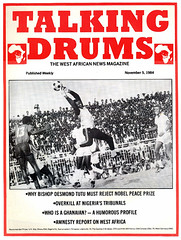What The Papers Say
Oil price crisis
National Concord, Nigeria
Only unrealistic people can fail to appreciate Nigeria's stand over last week's cut in oil prices.The Federal Government has stated that its decision emanated from three vital perspectives: the pressing need to meet the competitive nature of the oil market, arresting the falling price and protecting Nigeria's national interest.
These surely constitute good reasons for which no responsible government can ignore or be faulted. The stand is justifiable especially because oil remains the main source of the nation's economic survival.
Most member states of OPEC had at various times acted in desperation and had breached unilaterally, the organisation's restrictions in order to protect their national interest. The most recent was the barter deal between Saudi Arabia and Britain involving 36 million barrels of oil exchanged for 10 B747 aircraft - an action that caused slump in the oil market and resulted in oil price disruption.
The present administration has, since assumption of office, stressed solidarity with OPEC and demonstrated its belief in unity and stability within the organisation by sticking with it even under extreme economic pressure. Nigeria has also made a lot of other sacrifices, which more often than not, have jeopardised the economic and social interest at home.
As much as we believe in the principles and policies of to deny the reality of the class struggle and the solidarity of OPEC as an organisation, Nigeria needs internal economic security to ensure its fruitful participation. As the Energy Minister, Professor Tam David-West rightly said "there is a limit to our sacrifice."
Member nations of OPEC should examine the issues objectively and appreciate Nigeria's position. The organisation should tackle the challenge offered by the non- OPEC oil producers who have by and large acted as spoilers in the global oil trade. The responsibility for maintaining stability in the oil market should be borne by all producers within and outside the organisation.
Finally, OPEC should consider seriously, the suggestion that oil prices are no longer expressed in the dollar since the constant fluctuation in the currency has not often been in the interest of the producers.
People's Daily Graphic, Ghana
The Pope and liberation theology
Pope John Paul II, the Catholic Pontiff who has just ended a Latin American visit has added more fuel to the ideological fire raging on in the church on the issue of "liberation theology."In an end of visit speech in Santo Domingo, capital of the Dominican Republic, the Pope denounced the activities of Catholic priests in Latin America who, guided by the concept of "liberation theology" have taken the side of the teeming poor in their struggle for social justice.
The Pope considers liberation theology as inspired by marxist ideology and appears to condemn both as a knee- jerk reaction. We believe that the issues of poverty and oppression in the Third World are too profound to be treated in ideological straight jackets.
Today, in many parts of Africa, Asia and Latin America, the majority of the people live in virtual sub-human conditions whilst a tiny minority live in obscene opulence. This had prompted a fierce class struggle which is a fact of life.
The Pope said that the Catholic Church would support social liberation but denied that the poor constituted a class "a class in struggle". In what is a classic contradiction the Pope is reported to have called on the Catholic Church in Latin America to support "the poor."
But it is not just an ordinary contradiction. It is a contradiction rooted in the tradition of those who attempt the oppressed and the poor. In that tradition, the poor must be seen and treated as "unfortunate" individuals who deserve our sympathy; but they must not be allowed to struggle together for emancipation.
In defiance against the church establishment, several Catholic priests have openly identified themselves with the poor in the class struggle, and this is what irks both the secular and church establishment, for, these priests are able to provide both spiritual and political support to people who otherwise might be helpless.
Jesus Christ himself stood for the poor and he said he died for the poor. Though the church authorities would want us to believe that this only referred to the "poor in spirit", why should not the poor in body deserve the solidarity of the church?
